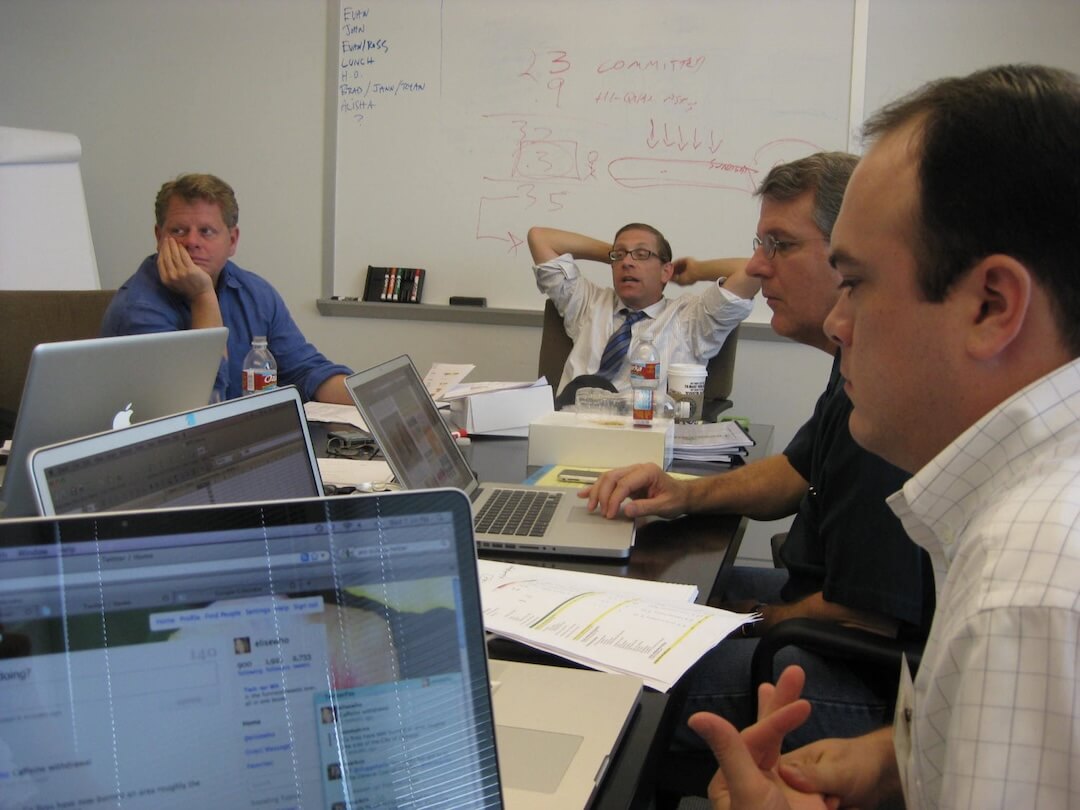The Cohort is Poynter’s bi-monthly newsletter about women kicking ass in digital media.
On April 21 at 5:30 p.m., I began the process of unplugging for three months. I sent a final email to my colleagues and turned on my out-of-office reply. I deleted Twitter and Slack from my phone. I reminded myself over and over to not check work-related messages or participate in journalism-related discussions on social media. I shut my work laptop and kept it closed.
My three-month sabbatical — which I took after my husband unexpectedly died — was the longest I’ve ever been away from the office. Deciding to take that time off was difficult. Would people forget about me or assume I couldn’t handle the pressures of work? Did taking a break mean I’m weak or not as capable as my colleagues? Would I be out of touch? What if I didn’t want to come back?
I returned to work on July 25, and I’m happy to report that none of those fears came true. After spending the past three months doing some major soul searching and learning how to take care of myself, I feel better equipped to excel at my job and escape burnout than I did in the disorienting weeks after Jamie died. I now appreciate the routine, distraction, purpose and stability that work provides. And I’m more grateful than ever for my colleagues and the journalism community at large for their support during an impossibly difficult time.
Like many people who take a maternity or paternity leave to learn how to be a parent and adjust to a wildly different life, I spent my time off learning how to be a widow and adjust to a solo life.
But returning to work can be awkward, especially if it’s rare for people in your office to take time off or truly disconnect during evenings, weekends or vacations.
Newsrooms, like many American workplaces, can demand notoriously long hours and provide little flexibility when it comes to balancing work and life. Katherine Goldstein’s Neiman Report story from last week explored how hard it can be for journalists who are parents. And last year, Poynter’s 40 Better Hours project examined ways to avoid burnout in the news industry.
Time and again, research has proven that taking breaks from work is good for employees’ productivity, morale, and health. And yet, we worry that working “normal” hours or going on vacation can be seen as slacking.
It’s time to fight that stigma and reclaim our lives outside of work.
So what can we do when we’re at a crossroads and need time off? Whether we experience loss or birth, illness or some other major event, life isn’t always tidy. Sometimes we have no choice but to stop and recharge.
As employees, we can:
- Prepare for a smooth absence. Before you leave for a vacation or longer break from work, make sure there’s a plan in place. Identify a contact person, or people, who can handle questions and tasks while you’re gone. Include those contacts in your out-of-office reply. And take those folks out for coffee or lunch beforehand to thank them, talk through details and alleviate their concerns.
- Truly break away. Stay away from email, Slack and the like. Jumping in and out of work not only takes away from your own well-deserved time off, but it sends mixed messages to your colleagues. Use this as an opportunity to show that you trust your co-workers to carry the torch while you’re gone.
- Be transparent. Explain why and how you’re unplugging from work. This mental health day email went viral in part because we aren’t always so honest about needing a break from our jobs. If you’ve decided to take some time off or figured out a flexible schedule arrangement, talk with your colleagues instead of doing it in secret.
As managers, we can:
- Help employees succeed upon their return. My boss challenged me to write an article within my first four days back on the job — a reasonable goal that helped me to get back in the swing of work. Identify projects that employees can participate in once they’re back in the office, check in often on their transition back and help identify incremental goals for the coming weeks and months to challenge and invigorate them.
- Be consistent. If you allow one employee to work a flexible schedule, that freedom should be offered to everyone. Setting aside some time to identify an arrangement that works for everyone on your team will avoid awkwardness and accusations of preferential treatment.
- Set a good example. Your employees look up to you. By sending emails at all hours and not taking true vacations, you’re setting an unhealthy expectation. Try to model good behavior and if you can’t — the news doesn’t follow normal business hours — be clear with your team on what you expect from them in terms of responding to work when they’re off the clock.
And for all of us, there are smaller things we can do on a daily basis:
- Turn off notifications. I did this during my sabbatical and liked it so much I’m keeping them off.
- Send emails at normal hours. Outside of breaking news, most other emails can wait. If you want to write something now but can wait for people to read it until tomorrow, use Boomerang.
- Commit to healthy routines. For me, that’s meditating every day before work and playing volleyball on Wednesdays. When I don’t do those things, my mood and energy plummet.
I’m lucky that Poynter allowed me to go on sabbatical. If you’re in a position where you can set a similar example — whether by taking time off, leaving work at normal hours, or truly unplugging while on vacation — do it. Taking care of yourself helps you take care of your colleagues and teammates. And speaking of taking, please oh please, take all of your vacation days.
xoxo
KHG
The deadline to apply for Poynter and NABJ’s Leadership Academy for Diversity in Digital Media is Aug. 18. It’s a fantastic tuition-free program for journalists of color. Get those applications in!
I’ll be teaching alongside Butch Ward, Kinsey Wilson and 2017 cohort alum Millie Tran in Poynter’s Leadership Academy in October. It’s a wonderful seminar for rising newsroom leaders. Seats fill up fast!
Things worth reading (and listening to)
The gender pay gap is still alive and well. Reporters at the Financial Times are the latest group threatening action. Let your coworkers know they are valued. Jen A. Miller, who traveled the country and found a new job in the process, is an inspiration. All my geeky interests have collided into one: Shankar Vedantam and Cal Newport on the value of ‘deep work’ in a distracting world. In their interview, I especially loved the idea that learning to focus on work, like meditation, is a skill that needs to be practiced and honed over time. Patience, friends.
Meet Katherine
Two years ago, Katherine Goldstein was the first person on her digital news team to become a parent. She returned to work after her 12-week maternity leave, but ultimately left the job for a Nieman Fellowship. Since then, she wanted to research and write a story about journalism and parenthood. “I soon realized the question of how to balance the demands of being a journalist and parent in the current news landscape wasn’t just a question I was grappling with alone,” she said.
That story — Where are the mothers? — published last week and has been shared and discussed widely among journalists. I reached out to Katherine, 33, to ask about the response she’s received and what’s next in her career. Our interview has been edited for clarity and length.
What has the response to your article been like from readers?
The response has been so moving and unlike anything I’ve ever experienced. I have gotten a lot of emails from people thanking me for finally addressing this — they are telling me they no longer feel like their difficulties are being ignored, and some wrote me to say they’ve been inspired to finally speak up about changing policies at their companies, which is incredible. I’ve also heard a lot of sad stories about discrimination and why people felt their newsrooms were so hostile they had to quit the industry. I wrote a follow-up about what it’s like to be a breastfeeding journalist, and the response I got was wild — from hearing about crazy places journalists have pumped while on assignment (like a men’s prison and a crime scene) to really depressing stories about news organizations who’ve shamed women for wanting to nurse and have been really unhelpful by not even providing what’s legally required for nursing mothers.
What advice do you have for employees hoping to affect change or start a conversation about flexibility in the workplace?
The first step is finding allies. Getting a group of people who share your concerns is a great way to start a conversation and figure out what are the specific issues at your company. Next, I recommend doing your homework to make a compelling business case for why flexibility and family leave will actually benefit the company. The research is all there. Focus on the bottom line, not that “it’s the right thing to do.” In my article, I profile the women at The New York Times who really focused on the business case for better family leave, and got much better policies in place. Also, check out this sidebar which has my full recommendations about how to advocate for change in your workplace.
What about managers? Even if there’s not a formal company-wide policy in place, are there steps that managers can take to better support their employees?
The first thing managers can do is set a tone where they are transparent themselves about their own work-life challenges to let employees know that they understand these issues are a part of life. It shouldn’t be oversharing, but just if managers themselves are upfront about a child care problem, dealing with a divorce or taking care of an ailing parent, it can relieve stress from employees who then don’t feel they have to hide problems they are going through that impact their work life. I’d also recommend if managers have found certain kinds of flexibility really work for some employees, attempt to codify them and make them official company policy rather than leaving them as an off-the-books special deal. This will help benefit more people and leaves employees better protected if their managers change. Oh, and don’t schedule impromptu meetings at 5:30 p.m. when parents have to rush out to do daycare pickup.
Would you advise someone who’s early in her or his career and hoping to start a family to go into journalism? Why or why not? What should they consider?
The challenges for all parents (but still disproportionately women) to balance work and family exist in so many industries, not just journalism. I believe people should always pursue what they are passionate about, and people without kids or are thinking of having kids are in a great position to advocate for more flexible policies for the whole company, because it shows organizations that this is important overall to keeping a talented workforce, and it’s not just about parents. Part of the reason I think so much hasn’t changed about this over the years is that the people most in need of help (i.e. new parents) are so exhausted and overwhelmed they have the least time and resources to push for changes. They are just trying to get through every day, and some might feel it’s better to quit than put their energy towards lobbying for policy changes.
As you know, the average American only uses 54 percent of their paid vacation time. And we work well past normal office hours. It seems, for many of us, fear and guilt are factors keeping us at work. For journalists feeling burnt out, how do we break that cycle?
I think journalists and managers have to start recognizing that working all hours and weekends non-stop and not taking real vacations doesn’t actually produce the best work. The news environment is crazy intense right now, but if we want to keep doing meaningful work for years to come, many of us need to “put our oxygen masks on first,” as the saying goes. I highly recommend journalism fellowships, inspiring conferences and lectures that introduce new ideas, and vacations that are so off the grid no one can reach you, even if they wanted to. (Try Costa Rica.) Also, if at all possible, take a Twitter break. It can be a deafening echo chamber, and I was able to start doing a lot more creative thinking when I took a two-month hiatus after the election.
I especially enjoyed the section of your story about paternity leave. Why is it important to have allies across genders when it comes to changing company policies and/or culture?
Men have a crucial role to play in this conversation. The best way for men to understand what women go through as new and working moms is to get them to take paternity leave. Studies show that it makes them better partners at home and better colleagues at work. Also, men still lead many organizations, so they often have the power to set policies and the tone for an organization. At Vox, Matt Yglesias, who is a co-founder, was the first person on staff to have a kid. He took a four-week paternity leave and set a positive precedent for work-life balance by leaving earlier in the evening, which made it much easier for the working mothers who came after him. Dads care about this stuff, too. Men are often judged less harshly than women for having family responsibilities, so that means they can be important allies and trailblazers in this fight.
What’s next for you?
I’ve got a lot of irons in the fire. I’m looking for a home to do regular writing on women and work and would like to do more speaking engagements on this topic. I also plan to expand into consulting on workplace issues, diversity and family leave policy. I teach a class on Developing your Career in Journalism online at the Harvard Extension School. It focuses on soft skills journalists need, like pitching, getting published, resume writing and job interviewing, which never get taught in school. I also offer these topics as shorter workshops and as individual coaching sessions for journalists at all career stages.
I’m particularly interested in helping women and people of color who are underrepresented in media break in and take their careers to the next level. I see over and over again that we undersell our abilities and skills. I was helping a veteran female journalist revamp her resume, and about three-quarters of the way through, she casually asked, “Do you think it’s worth mentioning on my resume that I was on a team that was nominated for a Pulitzer Prize?” I nearly fell out of my chair.
Enjoy this newsletter? Tell your friends and coworkers.
The Cohort is part of Poynter’s Leadership Academy for Women in Digital Media. Thanks to the ever-encouraging Kristen Hare for her newsletter edits and insight.







